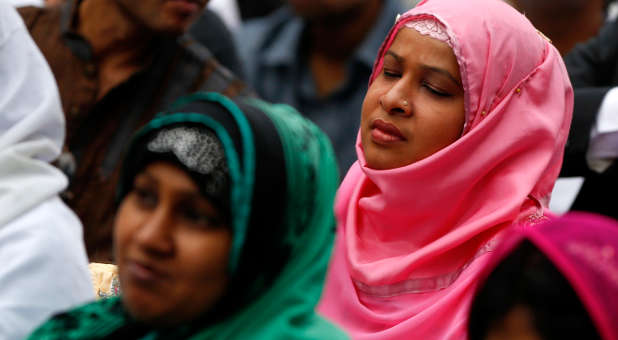‘It’s Almost as If the Devil Is Sitting on Your Shoulder Saying Kill, Kill, Kill”
ISIS is reportedly looking to China for new recruits among its 10 million Muslim believers. A new audio recording released online calls on China’s Muslim faithful to “wake up” and “take up weapons to fight.”
In what has been described as a “near-perfect Mandarin” pronunciation, the chant says, “The brilliance of Islam is etched in history. The purpose of our struggle is to let it shine again. Wake up! Muslim brother, now is the time to awaken. Take up your faith and courage, fulfill the lost doctrine.”
ISIS uses the internet to recruit new members from around the world and to spread chilling images of executions and other violent propaganda.
“ISIS is better resourced, more brutal, and more organized than any terrorist organization to date,” Martha McSally, Republican from Arizona told Congress. “We must use all the tools at our disposal to defeat them.”
One of those tools some say is to pressure social media companies to stamp out terrorist content online.
“We can get Twitter and Facebook to shut these accounts faster,” Dr. Anne Speckhard, an adjunct associate professor at Georgetown University said. “We need to be thinking about why do people resonate to these messages? Why does it fit some need inside of them and can we meet these needs in other ways?”
Speckhard is the author of several books, including Bride of ISIS andTalking to Terrorists. She says in addition to policing the multitude of online sites, more must be done to stop the poison from spreading.
“We {must} discredit their ideology,” Speckhard said. “They {terrorist recruiters} claim that they are going to create a utopian state, but the more the {fleeing} refugees come out, the more they say what is really happening in ISIS territory…These are insiders saying this not Islamic, this is corrupt, these people are rapists, horrible people, don’t come here, don’t join.”
Democratic Senator Dianne Feinstein will introduce legislation this week that would force companies like Twitter, Facebook and YouTube to alert authorities about potential terrorist activity on their networks.
“We’re in a new age where terrorist groups like ISIL are using social media to reinvent how they recruit and plot attacks,” Feinstein said in a statement. “That information can be the key to identifying and stopping terrorist recruitment or a terrorist attack, but we need help from technology companies.”
A sentiment echoed by president Obama during his Sunday Oval Office address when he said that he plans to call on high-tech companies to do more to combat the threat on online.
“We constantly examine our strategy to determine when additional steps are needed to get the job done,” Obama said. “That’s why I will urge high-tech and law enforcement leaders to make it harder for terrorists to use technology to escape from justice.”
But the idea of government censoring private companies has some civil liberty advocates raising red flags.
“The free speech concerns are really weighty because to the extent that these companies are acting at the instruction of the government, it’s essentially the government at that point,” David Greene, Civil Liberties Director at the Electronic Frontier Foundation, told The Hill.
The White House insists that tech companies should take specific steps to end ISIS and other terror group propaganda from continuing to flourish.
“We’re going to resist the urge to go and trample a bunch of civil liberties here,” Josh Earnest, White House press secretary said. “But there are steps that we believe we can work through with the technology companies to take some common-sense measures that would enhance public safety.”
Meanwhile, the head of Homeland Security wants some of the giant tech companies to give Muslim community leaders a platform to spread an alternative message online in an effort to counter the extremist’s propaganda.
“I’m asking them to partner with community leaders in the Muslim community to give them a larger platform for their message and larger microphone for the counter-message,” Jeh Johnson told ABC News.
The sense of urgency comes in the wake of the recent terror attack in San Bernardino when suspects, Tashfeen Malik and Syed Farook, murdered 14 people during a Christmas party.
Malik, the 27-year-old female shooter, reportedly pledged allegiance to ISIS on Facebook shortly before arming herself.
But security experts say stopping the web of terror is daunting as an army of online jihadists continually find ways to penetrate the hearts and minds of potential recruits.
A Brookings Institution report estimates that ISIS controls some 70,000 online accounts, sending approximately 90,000 texts daily.
Days after the Paris attacks, hackers from the group Anonymous declared “war” on ISIS vowing “a massive reaction” to the their online activity. Since then, Anonymous claims to have taken down more than 100 propaganda sites, as well as 25,000 social media accounts.
A member of Anonymous told Britain’s Sky News that a “Day of Rage” is planned against ISIS on December 11th when the group says it will attempt to destroy as many of their online sites as possible.
“ISIS uses social media as a mega horn to spread their rage and fear,” one hacker told the media outlet. “We are here to show them we are not afraid and that we know what they really are: “#Daeshbags”.
But Anonymous admits trying to shut them all down is nearly impossible.
A point the FBI’s director admitted to Congress earlier this summer. James Comey said his agency cannot stop ISIS on social media and does not “have the capability” to keep the “troubled minds” at home.
“Our job is to find needles in a nationwide haystack, needles that are increasingly invisible to us because of end-to-end encryption,” Comey said during testimony before lawmakers. “This is the ‘going dark’ problem in high definition.”
Comey says ISIS and other terror groups are increasingly relying on sophisticated technology that’s even difficult for the FBI to decrypt.
“It’s almost as if there is a devil sitting on the shoulder saying ‘Kill, Kill, Kill, Kill!’ all day long.”
Presidential candidate Donald Trump campaigning in South Carolina recently appears to have a solution: Shut the internet down.
“We’re losing a lot of people because of the internet,” Trump said during the campaign stop. “We have to see Bill Gates and a lot of different people that really understand what’s happening.”
The Republican front-runner worries that terrorists “are recruiting by their thousands” online and tech giants need to do “something with the internet” to stop their messages from getting through.
“We have to talk to them about, maybe in certain areas, closing that internet up in some ways,” Trump said. “Somebody will say, ‘Oh freedom of speech, freedom of speech.’ These are foolish people.”




























































